Michael A. Turton
|
Michael A. Turton |
|
| Recreation and Foreign Travel | |
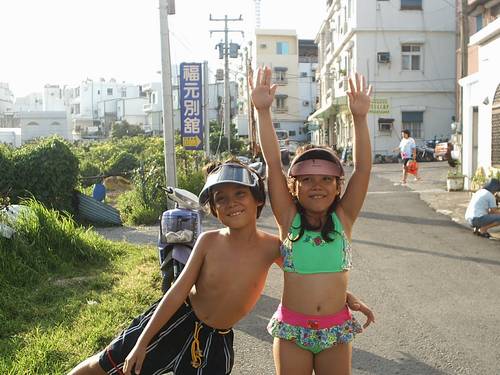 Yes!
We're hittin' the beach! Yes!
We're hittin' the beach! |
This page is not meant to be a guide for things to do in Taiwan. For that, be sure to bring along a copy of the Lonely Planet guide to Taiwan. Rather, this page is here just to suggest possibilities and sketch ideas.....so just meander on with me... |
| Taiwan offers many things to do on those rare days off. The downside is that since everyone has the same days off, every place interesting is packed on holidays. Additionally, most of the things in Taiwan are the kind of things you can only do once. |
| The island has many excellent public and national parks in scenic areas. I actually think Yangmingshan National Park on the northern end of the island is more beautiful than Kenting National Park on the south, but most would disagree. Taroko Gorge and the cross-island highway which runs through it is nothing short of spectactular. |
| The East Coast, still undeveloped as of this writing (though plans are in the works to destroy it through the creation of industrial districts), is a great place to swim, hike, or just drive. Equipment may be rented or purchased in the major cities. Taimali, an impoverished little fishing port on the East coast, is where we like to vacation. The Su-Hua Highway between I-lan and Hualien, cut into towering cliffs above the ocean, is also a wonderful drive. |
| Camping, surfing, scuba diving, sport fishing, hiking, canoeing, mountain climbing and many other outdoor sports are a possibility. I have friends who go bungee-jumping, hang-gliding, paragliding, and so on. |
| I personally consider these sports a form of Russian Roulette here on Taiwan, where people care little about both safety and regulations. |
| Despite what you may have heard, it is old ideas, not old
things, that
are revered in Chinese culture. Much of the island's past has been
destroyed,
either by development or by systematic destruction at the hands of the
occupying Nationalists, who had a fixed policy of stamping out
Taiwanese
culture (the 9/21 earthquake also dealt a major blow to the island's
cultural
relics).
|
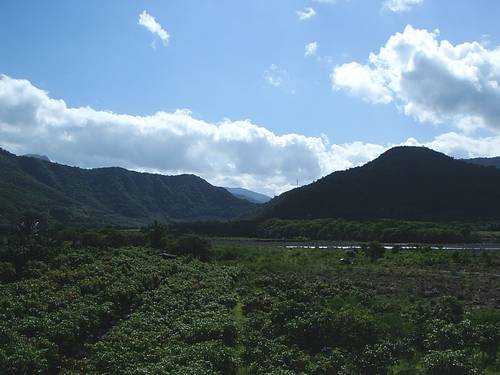 Mountains
loom above a riverbed in southern Taiwan. Mountains
loom above a riverbed in southern Taiwan. |
Fortunately there is still plenty of interesting stuff lying around, especially temples. The resort town of Chiu Fen in northern Taiwan, popular with day-trippers from the capital, is next to an interesting Japanese WWII POW camp and the island's gold and gem mines (now pretty much worked out). |
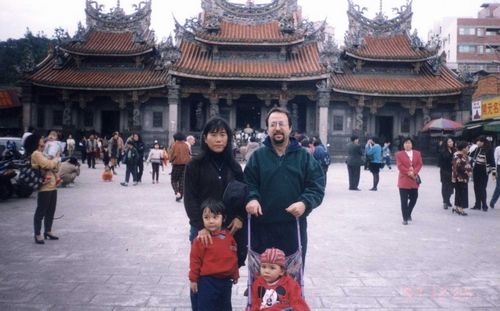 This ornate temple in Sanhsia outside of Taipei is one of
the best
preserved
of its style on the island. With open spaces, a high tolerance for kids
and lots of food vendors, temples make great outings for couples with
small
children. This ornate temple in Sanhsia outside of Taipei is one of
the best
preserved
of its style on the island. With open spaces, a high tolerance for kids
and lots of food vendors, temples make great outings for couples with
small
children. |
Ta Shi, in Taoyuan, still has many old buildings, as does Tamshui, though in both cases these are rapidly vanishing. |
 A cannon in the historic city of Tainan. |
Even Taipei and Keelung still
have streets full of older
buildings.
Tihua Street in Taipei, the spice and textile merchants' street, has
been
protected by law, partly because of its old-time flavor, partly because
it was a major execution ground during the 2-28 revolt and subsequent
terror. |
| Old temples can be found in every locality. Major settlement from China began only in the seventeenth century and thus there are no really ancient buildings on the island (although there are some monoliths erected by local aborigines still standing along the SE coast). |
| A few remains of forts exist from this period, but little else. Taiwan's prehistory is complex, interesting, rich and well-preserved in local museums and site parks around the island. |
| My personal favorite town in Taiwan is Lukang, now a sleepy port city in central Taiwan. Many of the older streets have been deliberately preserved to create a 19th century feel, when Lukang was a large, thriving port, the second largest city on the island. The town is stuffed with old temples. |
| We also love Tainan, the former Dutch and Ching administrative capital, with many old buildings, temples, and even the remains of a fort or two. Although preservation has been OK, especially since Tainan is a major center of Taiwanese nationalism, presentation in English is often hit-or-miss. |
| Thousands of traditional Taiwanese red brick farmhouses still dot the countryside. Sadly, most are crumbling, since Taiwanese rarely spend money to make their homes look nice. | |
 Fish markets make great outings. |
|
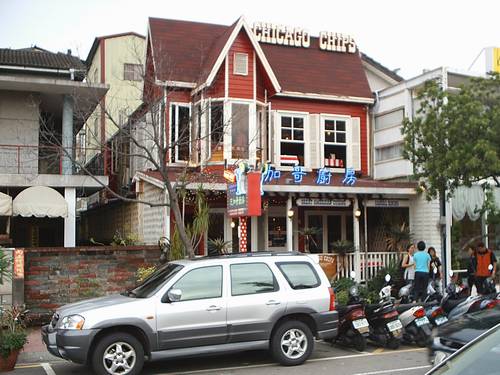 An
upscale American-style restaurant in Taichung.
An
upscale American-style restaurant in Taichung. |
The cities offer many modern cultural attractions, from pubs to art museums. There is a thriving alternative culture in Taiwan's major cities, embracing all the arts. However, a broad selection of good western restaurants is really available only in Taipei. |
| Two views of Flying Cow Ranch, a "leisure farm" in Miaoli County. |
| Tourist traps of all kinds have sprung up in mountainous areas all over the island. Recreational farms like Flying Cow Ranch offer various activities, including ice cream making, and large green spaces. For Taiwanese used to living in cramped, gray and dirty urban environments, places like Flying Cow offer a rare glimpse of green and clean. |
| Guest houses, small inns, and bed-and-breakfasts are springing up all over the island, especially on the east coast, where tourism is the major industry. They are usually quite comfortable and cost between $500-$2,500 a night. | |
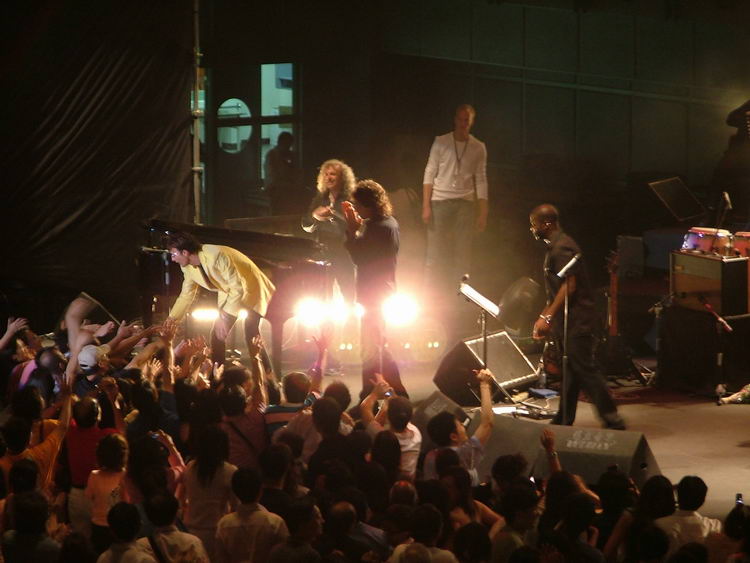 Robin Gibb works the crowd at a concert in Taipei. |
|
| Food is the great recreation of the Taiwanese, and they will frequently travel miles out of their way just to eat a famous local treat. The vast array of local foods is one of the most enjoyable aspects of Taiwan. See my page on Food for more highly enjoyable details. |
| Night markets, a tradition dating back centuries,
are one
of the island's most popular hang-outs. See
my page on night markets for more on this great Taiwan tradition.
Great fun can also be had at the island's morning
markets
or fish
markets. |
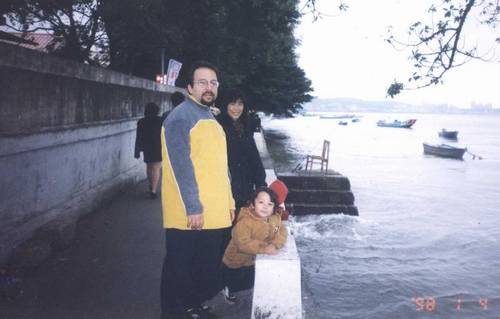 At
Tamshui in 1998. This historic town, now instantly accessible on the
metro,
makes an interesting day trip from Taipei.
At
Tamshui in 1998. This historic town, now instantly accessible on the
metro,
makes an interesting day trip from Taipei. |
Taipei boasts the formidable National Palace Museum, one of the world's major cultural institutions, which houses millions of artifacts brought over from the mainland by the Nationalists after their defeat. |
 My kids at play on a beach along the east coast.
Taiwan has a
small
number of good beaches, but most beaches are extremely dirty. My kids at play on a beach along the east coast.
Taiwan has a
small
number of good beaches, but most beaches are extremely dirty. |
The cities have gay and lesbian communities, but I know nothing about them. |
| Other sorts of amusements, from pinball to
swimming pools
to go-karts to bookstores, can be found on every corner. And there's
always getting together with friends for a
round of Axis and Allies over beer. |
| Taiwan also boasts a theme
park and
zoo combination, Leofoo Village. It's tame, but the kids will enjoy it.
Our visit to Leofoo is immortalized here. Our
trip
to Window on China, another theme park, is on the web here. |
| Shopping is always fun, whether in night markets or department stores. |
| There are many quite good smaller museums around the island maintained by local governments. Here is the 921 Earthquake Museum in Wufeng. |
|
Theatres show western movies and movie rental places are everywhere (Blockbuster has appeared in Taiwan). Kids movies come both dubbed in Chinese and in the original English. Be sure to rent or buy the right one! Sadly, few older movies, unless they are relatively famous, will be available in Taiwan. Most films will be from the near present. Thus, all of the great Oscar winners are available, but few of any other golden age films. Movies from the 60s, 70s and 80s of high quality or interest, such as Dr. Strangelove or One Flew Over the Cuckoo's Nest, will be difficult to find. Movies are cheap in Taiwan, even legal movies, with Chinese subtitles. Classics can be had for six for $500 in the retail outlet near our house (God forgive me -- I have everything Charlton Heston did in the 1950s). DVDs are also cheap. |
| Bars and pubs are popular with foreigners, but the bar scene gets old fast, and given the level of stress foreigners are undergoing in Taiwan, drinking is a dangerous habit to get into. |
| As for drugs, don't be stupid. Either drop
your habit
or don't come. The police here just love to bust
foreigners,
and even a pinch of something illegal will get you a zillion years (a
recent foreigner drug bust)(and further
discussion at Forumosa)(and still
more). |
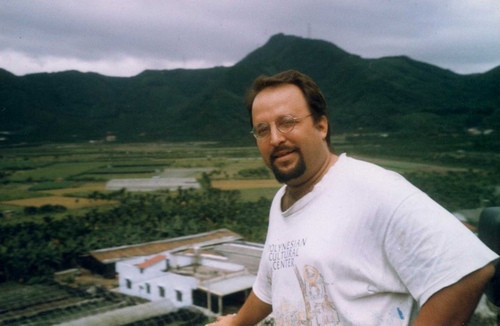 Near Sun Moon Lake in 1999. The
mountains offer relief from the
island's
polluted, teeming cities, but most of the infrastructure was destroyed
in the September, 1999 quake. Many of the mountain roads were blocked.
Lacking the will and the funds, the government has not re-opened them. Near Sun Moon Lake in 1999. The
mountains offer relief from the
island's
polluted, teeming cities, but most of the infrastructure was destroyed
in the September, 1999 quake. Many of the mountain roads were blocked.
Lacking the will and the funds, the government has not re-opened them. |
| In addition to the recreational farms, which offer clear air and outdoor activities along with rooms and campsites, there is also an increasing number of bed-and-breakfast places located in the mountains. Hiking in the mountains is always fun, as even low altitude hikes around the margins of Taiwan's cities offer great views and good exercise. The East Coast also offers plenty of hiking opportunities. Freshtreks offers hiking tours and treks in the mountains. |
| The government has been slow to grasp the island's limited but important tourist potential, but it is finally bestirring itself. |
| Much of the new tourist development has been concentrated on the still unspoiled east coast. Taiwan's east coast is a fabulous playground of parks, lakes, hiking trails, sea cliffs, and rock formations. Here's a quick peek. |
| Many people spend time on the Net and with their computers. Taiwan is a computer paradise and hardware and software can be obtained cheaply. The latest game software is anywhere from 25-75% cheaper than in the US (never mind illegal software) and comparable savings are obtainable on applications software. |
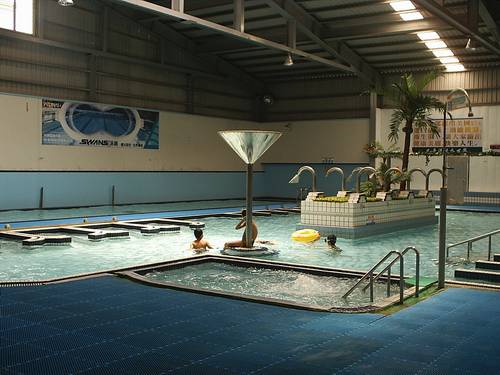 Don't
forget! Lots of local private health and swimming complexes offer
attractive
destinations for boring afternoons. This well-maintained swimming
center,
with five pools, is located in the tiny town of Beitou in central
Taiwan. Don't
forget! Lots of local private health and swimming complexes offer
attractive
destinations for boring afternoons. This well-maintained swimming
center,
with five pools, is located in the tiny town of Beitou in central
Taiwan. |
Pirate software is available, though no longer so openly in Taipei. In Taichung and Kaohsiung the computer store districts are rife with pirate dealers. Pirate CDs may also be obtained in night markets. Additionally, many night market stalls sell legal software at dirt cheap prices, obtained when stores went under. |
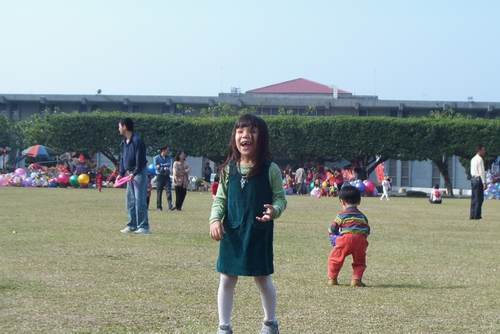 In an open area at the former provincial capital,
Chunghsinghsintsun.
The
new capital was built to house the provincial government and its
employees
after the current government fled to Taiwan in 1949. Taipei is merely
the
temporary national capital. In reality, the provincial government, now
frozen and no longer functional, was a way to provide jobs for the
ruling
party faithful. The real Taiwan miracle is that the economy grew so
well
under such parasitic, inefficient and hopeless misgovernment. In an open area at the former provincial capital,
Chunghsinghsintsun.
The
new capital was built to house the provincial government and its
employees
after the current government fled to Taiwan in 1949. Taipei is merely
the
temporary national capital. In reality, the provincial government, now
frozen and no longer functional, was a way to provide jobs for the
ruling
party faithful. The real Taiwan miracle is that the economy grew so
well
under such parasitic, inefficient and hopeless misgovernment. |
Taiwan is close to everywhere. There are a million travel agents and shopping around is always possible. Package tours are very common, since Taiwanese rarely get large amounts of time off from work (long working hours serve authoritarian political purposes and it is difficult to get them cut. It is no coincidence that a reduction in working hours is occurring as Taiwan democratizes.). |
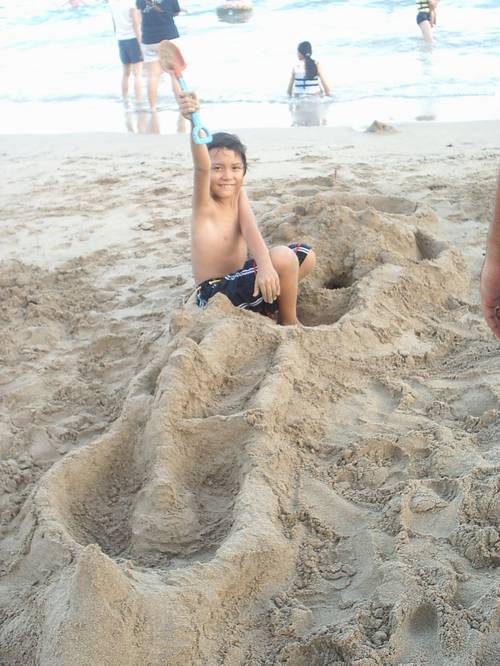 Success! Another satisfied vacationer in Kenting. Success! Another satisfied vacationer in Kenting. |
Your major problem is getting visas for places which have no diplomatic representation in Taiwan, but most countries have representative offices and if not, your travel agent will get you a visa in Hong Kong or elsewhere. Courier services often offer cheap tickets to overseas destinations if you carry a package. |
| Taiwan can be great family fun! Check out our weekend at Kenting National Park! |
| Taiwan is also an excellent base for exploring Asia, just a few hours from any destination. Here is our website on our trip to Sri Lanka in 2004. |